Police inquiry report: Civilian unit to probe police integrity complaints
Annastacia Palaszczuk has backed Police Commissioner Katarina Carroll to instigate massive changes to the service, saying no senior officers would lose their jobs after a damning report into responses to family and domestic violence pinpoints a ‘failure of leadership’.
Police & Courts
Don't miss out on the headlines from Police & Courts. Followed categories will be added to My News.
A ‘raw and confronting’ report delivered in the wake of a inquiry into police responses to domestic and family violence has criticised leadership of the service and Police Commissioner Katarina Carroll’s understanding of existing disciplinary procedures.
Among the 78 recommendations delivered, and accepted by the state government, after five months of evidence were that police would no longer investigate police, and that a “pocket-sized checklist” be produced for officers responding to domestic and family violence.
It also recommends police improve the processes for reporting DV at stations within six months by designating private and secure areas for people to report or discuss such matters.
The State Government has pledged $100m to action reform, which will include hundreds of extra domestic and family violence officers across Queensland.
Deputy Commissioner Steve Gollschewski has been charged with co-ordinating massive reforms and will report directly to the government, a move Premier Annastacia Palaszczuk told a press conference was not a sign of no confidence in Ms Carroll.
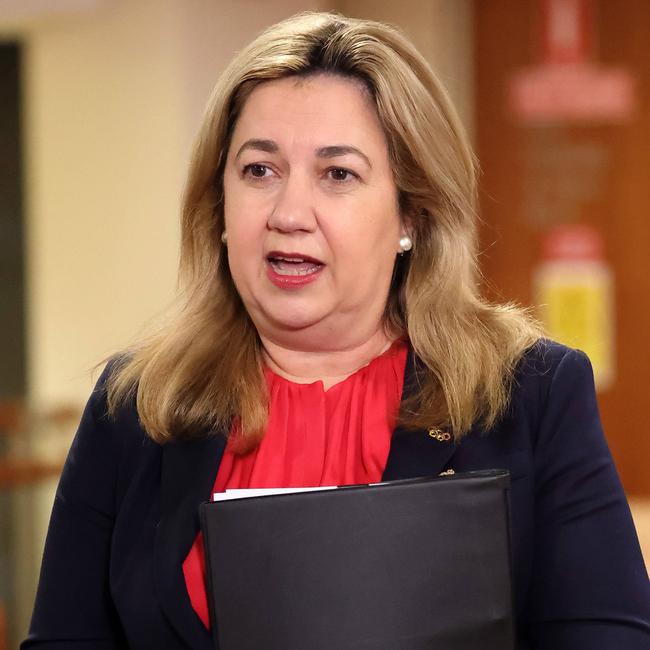
The report described the issues within the Queensland Police Service as a “failure of leadership”.
“Despite the initial protestations of the Commissioner of Police and the President of the Police Union of Employees, the Commission has found clear evidence of a culture where attitudes of misogyny, sexism and racism are allowed to be expressed, and at times acted upon, largely unchecked,” the report said.
“Where complaints in relation to such treatment are brushed aside or dealt with in the most minor of ways and those who complain are the ones who are shunned and punished.
“It is hardly surprising that these attitudes are reflected then in the way that those police who hold them respond to victim-survivors.
“It is a failure of the leadership of the organisation that this situation has been allowed to continue over many years unchecked.”
The report said that despite this, many police did respond appropriately to domestic violence call outs.
“The Commission has heard of many cases of police officers who are dedicated and caring, who act to protect victim-survivors of domestic and family violence as best they can and who respond in innovative ways to improve their lives and hold perpetrators to account,” the report said. “Those officers should be proud of their efforts and deserve to be recognised for the work that they do.”
The report criticised Ms Carroll’s understanding of her own disciplinary system, particularly the use of local managerial resolution.
The “LMR” process involves a “chat” with a more senior officer and is supposed to be used for one-off, minor incidents.
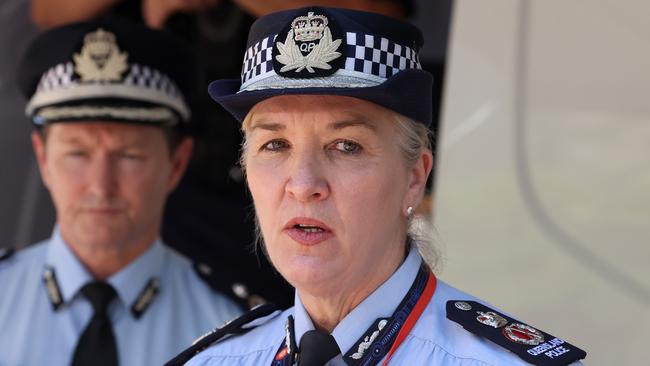
The inquiry heard it had been used inappropriately to “discipline” serious and repeated behaviour. Ms Carroll has since announced changes.
“It is concerning that it took appearances before a Commission of Inquiry for the leader of the QPS to gain a full understanding of how the Local Management Resolution processes within the conduct and complaints system work,” the report said.
“The Commission also notes that the Police Commissioner is, by legislation, contract and strategic planning, responsible for promoting a professional organisation characterised by ethical conduct.
“Her lack of understanding of her organisation’s complaint system in circumstances where the system is supposed to monitor and control the ethical health of the membership reflects poorly on her leadership.”
Ms Palaszczuk described the report as “raw and confronting” but said the Ms Carroll had her support.
“ ... At the end of the day this is about improving response to domestic and family violence,” she said.
“But what this report does is it essentially rips the Band-Aid off and says there are some deep seeded culture issues about the way in which some members, and let me stress, some members of the service interact with first nations people ... and how they interact with women. These will be nation leading reforms.”
Ms Palaszczuk said an Assistant Commissioner for First Nations will also be appointed.
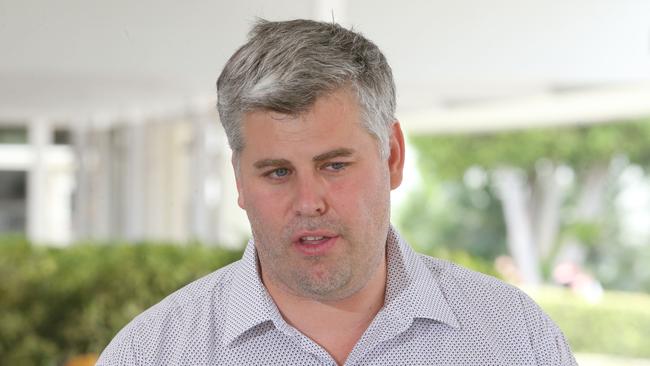
Ms Palaszczuk said she trusted Police Commissioner Katarina Carroll to implement change.
“To bring about the reforms and cultural change needs a strong woman, and that strong woman is Katarina Carroll,” she said.
“This is going to be confronting and it’s going to take every ounce of her strength to bring about this reform and I’m confident she is the right person to do it.”
The Premier said Ms Carroll had given her a firm commitment that she was 100 per cent up to making changes.
“I think she has stood by [police] in the two years of a world pandemic ...,” she said.
When asked if Ms Carroll had been put “on notice”, she said “let me say very clearly, I expect the reforms to be implemented”.
Ms Carroll currently has two years left on her contract.
On Mr Gollschewski’s role, Police Minister Mark Ryan said he had “the leadership and respect to manage the reforms”.
Mr Ryan said the report would be hard to read for members of the force.
“The good people of the Queensland Police Service who commit themselves to serving the people of Queensland with integrity and honour will feel the comments around this report very personally,” Mr Ryan said.
“Today is a hard day for the Queensland Police Service but it is also an important day because it is days like today that will improve the system and make good people do good work.”
Timelines for some of the recommendations to be implemented were as soon as three months time, but Mr Ryan was confident it would meet the deadlines.
“We need to move quickly, and I know the QPS will do its best.”
The DFV inquiry into the service was the most damaging probe into the service since the watershed Fitzgerald Inquiry.
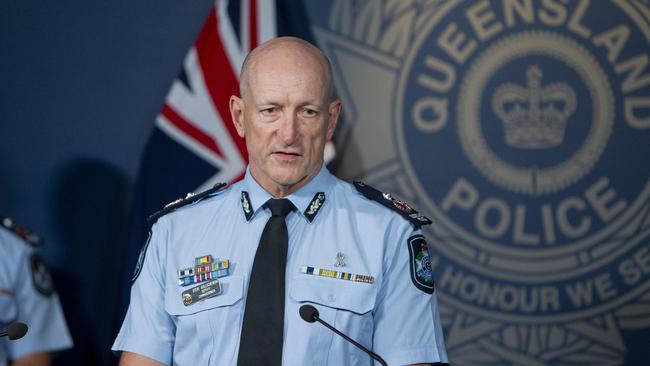
Counsel assisting the inquiry Ruth O’Gorman KC detailed multiple cases in which male police officers had not been properly disciplined for creepy and frightening sexual behaviour towards young female colleagues.
Police Commissioner Katarina Carroll, who originally declined to attend the inquiry, was grilled by Ms O’Gorman about what action had been taken against officers and whether there were systemic issues with the behaviour of police officers.
Ms Carroll denied a widespread cultural problem with police, however, agreed there were issues relating to sexism, misogyny and racism.
The inquiry was told of an officer threatening rape, multiple cases of unwanted touching and another who threatened to punch a superior in the “c--t”.
Many of the male officers who were the subject of sexual harassment allegations were dealt with by local managerial guidance where they were spoken to by a senior officer, in a system Ms Carroll agreed was “broken”.
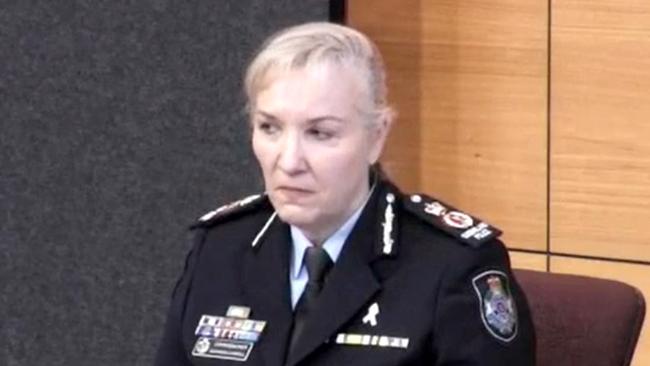
In giving her own evidence Ms Carroll told the inquiry she had herself been subject to a sexual assault and harassment multiple times in the 80s and 90s early in her career.
The inquiry also heard a dossier compiled by women police in 2017 and 2018 about their lived experiences included one who said she had been raped and also knew of five other women who had been attacked the same way.
The woman said she had been called a “slut” and “lesbian”, had been touched on the bottom, had hands put down her front and was told to pull up her shirt for a “tit inspection”.
Ms Carroll told the inquiry she wanted new “no confidence” powers to sack bad cops not properly disciplined, in a move which would require the government to change laws.
But later said she wanted to review cases of bad police and see what could be done within existing legislation.
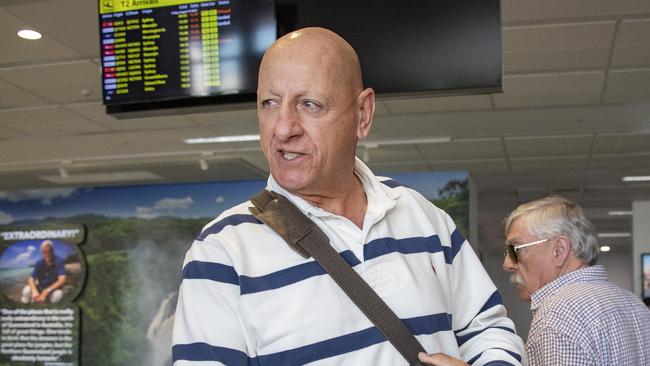
Deputy Commissioner Paul Taylor resigned a day after the inquiry was told he’d referred to a gynaecologist friend as a “vagina whisperer” during a formal speech at a leadership conference with other police.
The inquiry also heard another senior officer, Chief Superintendent Ray Rohweder, called out “did she shut her legs on you”, after the emcee of a separate leadership conference joked about a “rough promotional process” while referring to a cut on his face.
Both Mr Taylor and Chief Supt Rohweder were dealt with at the time with “local managerial resolution”, which involved a discussion with a more senior officer about their behaviour.
Chief Supt Rohweder is on leave and the service has said Ms Carroll is seeking legal advice about the officer.
Ms Carroll originally declined to attend the inquiry.
DFV command Assistant Commissioner Brian Codd was re-called to answer questions about the command as well as an alarming intelligence report that said victims were at risk of dying in the state’s Far North because of a lack of police action.
The officer’s 2021 report found police had not taken action against perpetrators after observing spouses with bloodied lips, swollen faces, black eyes and severe facial injuries from a glassing.
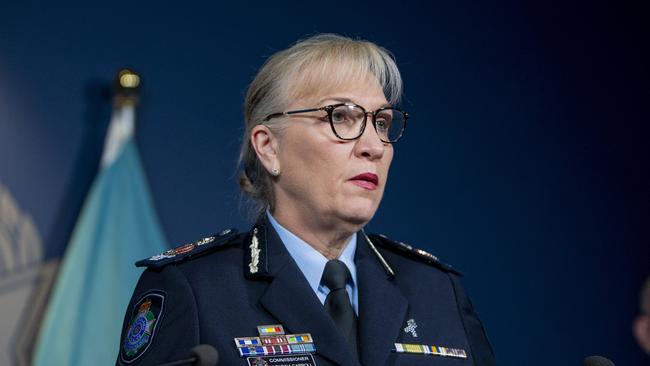
Professor Tim Prenzler told the inquiry that police should no longer investigate police and a new entity should be set up to probe misconduct or the CCC should be split and have its crime portfolio moved.
Prof Prenzler said with the current Crime and Corruption Act there had been a “much greater departure from the original Fitzgerald vision” and the majority of complaints against police were referred back to the police service as part of the “devolution” process.
The inquiry was told that when its predecessor Crime and Misconduct Commission was operating the devolution figures were about two per cent of investigations but now the CCC investigated less than one per cent of police complaints.
He said Queensland should set up a “civilian control model”, which didn’t use serving police officers and had the authority to investigate and determine the outcomes of complaints.
Under the model, all complaints and allegations about police would be made to the independent authority.
Prof Prenzler said the “gold standard” for investigating complaints against police was the Police Ombudsman for Northern Ireland (PONI), which was a civilian control model.




